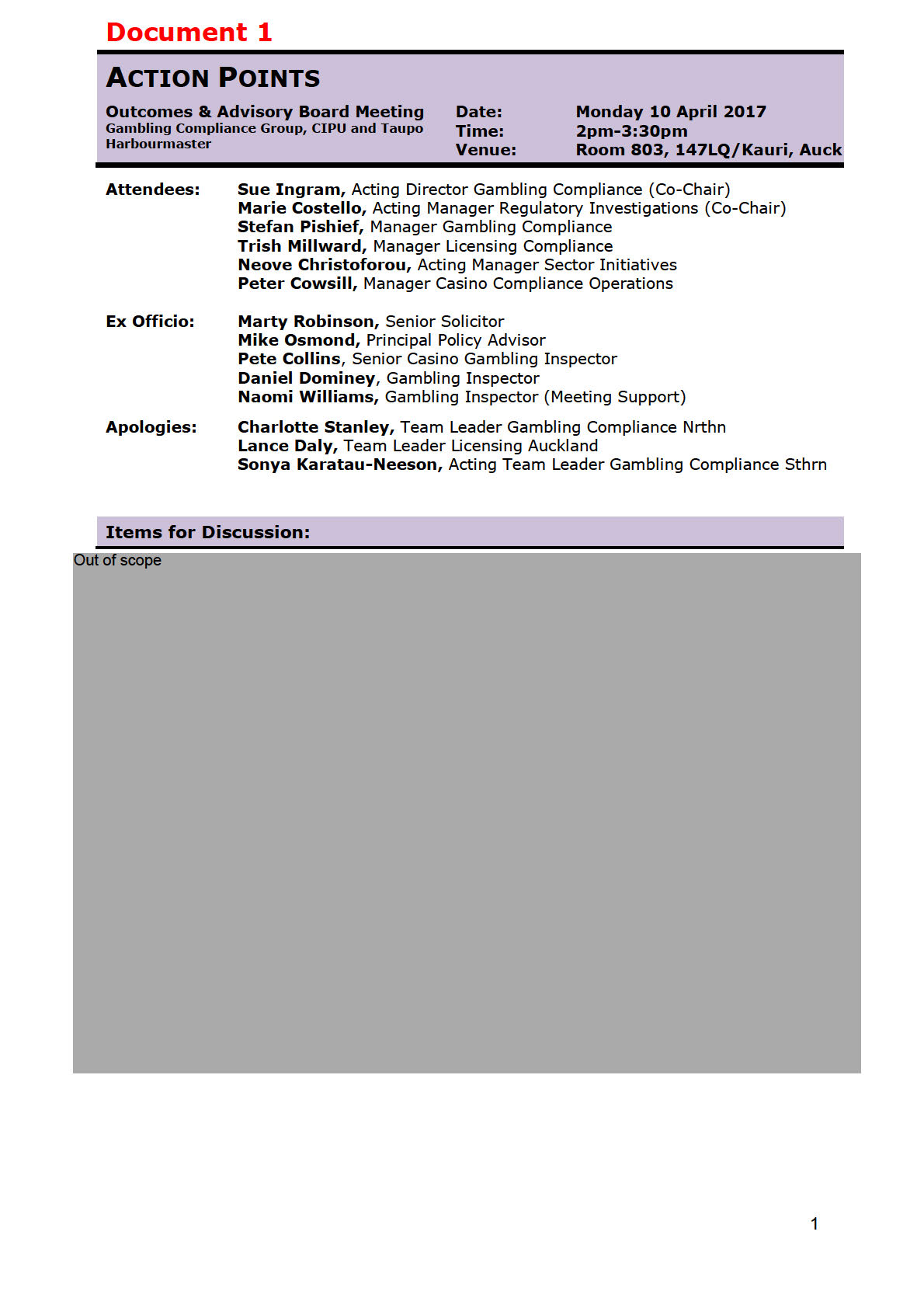
1982
Act
Information
Official
the
under
Released
Out of scope
1982
Act
Information
Official
3.
PAPER - Licensing Trusts
(Decision)
the
Author: Daniel Dominey
Decision Maker: Stefan Pishief
PURPOSE
under
The purpose of this paper was to provide better visibility for the role
Licensing Trusts play in the Class 4 sector and identify any issues, concerns
and/or risks that may exist with the roles and operations of the trusts with
•
Stefan to provide
societies and venues.
on-going updates
about progress
DECISION
with Licensing
Released
• OAB members agreed legislative reform was the most appropriate way
Trusts.
to manage the position the Licensing Trusts and their Management
Service Providers had been placed in following recent changes to the
Gambling Act. It is likely to be a couple of years before legislative
reform is made.
• In the interim, the Department will speak to the Licensing Trusts
involved and encourage them to voluntarily change their structure to
manage any risk. OAB members believed this was particularly relevant
to Trust House Foundation, given the commercial element of Trust
House Ltd.
2
No. Discussion
Action Points
• The Department is to advise the NZLTA of this decision.
•
Daniel to draft a
stakeholder
•
Daniel to draft a stakeholder management plan and present it to OAB
management plan
on 8 May 2017.
and present it to
OAB on 8 May
RATIONALE
2017.
• The Department considers Licensing Trusts (with no commercial
element) to be low risk, given members are elected by the community.
• Policy have confirmed they are aware of this issue, and are considering
it as part of the Class 4 review.
• 9(2)(g)(i)
1982
Out of scope
Act
Information
Official
the
under
Released
3
No. Discussion
Action Points
Out of scope
1982
Next Meeting: Wednesday 26 April 2017 @ 12pm-1pm in rooms 803 147LQ/Kauri, Auckland
Act
Information
Official
the
under
Released
4
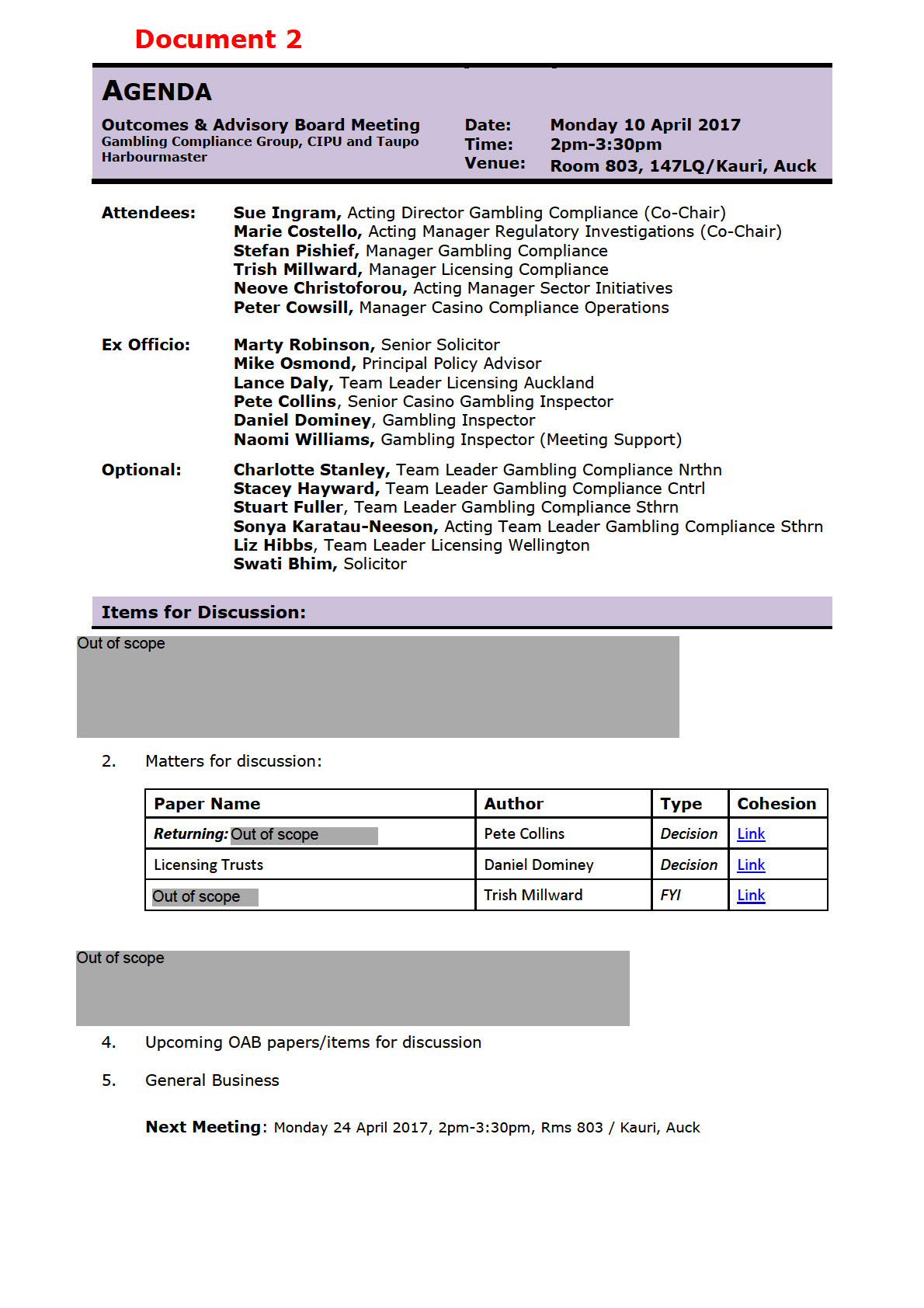
1982
Act
Information
Official
the
under
Released
Document 3
Communications with Licensing Trusts over MSP related issues
Key Messages
The Department’s position is that ILT, MLT and THL are MSPs that are included within
the provisions of the Act and therefore breach the Act.
The Department recognises that generally licensing trusts are low risk regarding the
integrity of gaming operators, and the intent of the changes to the Act regarding
MSPs was not to capture licensing trusts in this way.
The Department is investigating a legislative solution as part of the class 4 strategic
review to resolve this matter – this is the long-term solution given any regulatory
reform is some way off. Licensing trusts will be involved in this consultation.
1982
In the interim The Department needs to consider what options are available to it.
Although we prefer not to take an enforcement orientated approach for the existing
Act
breaches of the Act, we also can’t ignore the current status.
We want to work with licensing trusts in finding an interim solution and we’d like you
to consider changes to your structure that may remove these breaches and potential
risks before getting back to us. We see this as part of an ongoing engagement.
We have appreciated the good levels of engagement from licensing trusts to get us to
this point, and we are eager for this to continue.
Information
Individual Licensing Trust information
ILT
Official
9(2)(h)
the
Low Costs/ARN – ILT is one of the lowest costs MSPs and its overall costs would be
considered to be ARN. under
Sole Entity – ILT is sole entity and ILT Foundation can be considered part of that entity but
separated by a legal fiction as required by the Gambling Act.
Staff and venues – ILT has three staff and 10 venues
Good model – ILT could be considered a good model of a LT and MSP.
Charitable entity – ILT is a charitable entity and provides a wide range of grants to the
Invercargill community.
Released
MLT
Legal position – MLT has no Legal position but does not consider themselves to be a MSP.
Costs/ARN - MLTs costs are low to medium but as MLT do not cover the full range of MSP
services there may be reason to investigate for possible ARN issues.
Part of a larger entity – MLT is Part of larger entity (TTCF) which has contracted some
services to ILT
Staff and venues – MLT has 55 venues and three staff.
Acceptable model – MLT can be considered an acceptable model of a LT acting as a MSP.
Also it is a medium sized LT in the NZ LT sector.
Page 1 of 5
Charitable entity – MLT is a charitable entity and provides grants to the Clutha community.
9(2)(ba)(i)
THL
9(2)(ba)(i)
High costs, definite ARN issues – THL has the highest costs of the entire MSP sector and
there are definite ARN issues. Further investigation will likely be required.
Commercial entity – THL is a commercial profit making entity but Trust House Foundation,
which THL is contracted to, is a charitable entity.
Staff and venues – THL has 10 venues and 14 staff and is owned by two LTs.
1982
9(2)(g)(i)
Act
Legal Representation – Jarrod True represents THL at this time
General Considerations
Currently there is no common consensus among the three LTs as to their position as MSPs in
the C4 sector. Additionally the differing situations and concerns regarding the three mean
Information
that the same approach may elicit different responses from the LTs. For example:
ILT does not accept that it is a MSP and may resist attempts to restructure its
contract with ILT Foundation but otherwise may be amenable to changes as any
changes required would be the easiest to implement to its structure
Official
MLT does not accept that it is a MSP and may resist the loss of income from TTCF
resuming functions it had contracted to MLT
the
THL accepts that it is in breach of the Act and therefore be amenable to making
changes but the serious ARN issues mean that it may resist changes to its contractual
or costs structures as likely changes would see a significant decline in profit from
under
servicing THF
It is important to remember that there are three separate contracts, each between
two legally separate contracting parties and that any resolution will need to include
consideration of both sides positions to achieve a satisfactory outcome
All three MSP contracts have break clauses
Released
As there is no guarantee that all three LTs will act or behave the same or accept the chosen
outcome or even be willing to engage further with the Department once its initial messages
have been communicated it is important to retain options for other actions in the event of
this occurring.
As noted in the main review there are also a number of perceptions (C4 sector, wider public)
that need to be considered when discussing any further approach to the three LTs.
Page 2 of 5
Joint coms matters
Auditor General’s report on LTs
The 2014 Auditor-General report on all LTs in NZ noted that they were “concerned that
licensing trusts are one of the least scrutinised part of the public sector” and that “there is
no comprehensive oversight of licensing and increasing number of LTs were struggling
financially with profitability and financial viability”.
The report also noted that trustees of licensing trusts are subject to the Local Authorities
(Members Interests) Act 1968 which helps to ensure that personal interests do not affect
trustees when they participate in decision making. The two specific rules noted in the report
are that trustees cannot:
1982
Enter into contracts worth more than $25,000 in a financial year with the licensing
Act
trust they have been elected to govern; or
Participate in matters before the licensing trust in which they have a pecuniary
interest, other than an interest in common with the public
In the case of ILT there is unlikely to be any breaches of this Act. In the case of THL and MLT
there may be breaches of this Act.
Information
Some of these matters (noted concerns and legal considerations) may directly relate to the
LT review while others are peripheral but inform the overall position.
NZLTA conference in June 2017
Official
The Department has been invited to the New Zealand Licensing Trust Association (NZLTA)
the
annual conference in June 2017 to speak about changes in the C4 sector.
This would be an excellent opportunity to connect with all LTs in the C4 space but would not
be the most appropriate forum to discuss matters relating to LTs which contract MSP
under
services to themselves.
Licensing Trusts in the general Media
Licensing trusts appear from time to time in the media including a recent article where David
Seymour – leader of ACT, criticised the monopoly of ILT. Previous articles have included the
Released
Waitakere LT (over its use of funding for advertising) and Trust House (in relation to some
sculptures that had been funded in part by THL).
Based on the general tone of the media and comments made by the LTs themselves it would
be fair to assume that LTs are sensitive about their role in the community (ie gambling and
alcohol) in much the same way as the C4 sector are about gambling.
Page 3 of 5
Legislative Tools Available
The 2009 Gambling Commission decision (The Trusts Charitable Foundation decision
GC11/10) and
The Secretary for Internal Affairs v Administrative management Services Ltd.
These two outcomes from the Gambling Commission upheld the Departments position
regarding the following and could prove useful in regards to dealing with the three LTs :
The use of contractors (MSPs) rather than employees was acceptable but only when
the society could show that the use of contractors was more efficient. The onus was
on societies to justify the cost of third party contractors
MSP rate of charge had to be reasonable and excessive rates were a source of
concern
1982
Cost structures and supporting documentation had to be itemised and sufficient to
clearly show a breakdown of costs
Act
A 2011 issue of Gambits provided advice on the structure of MSP contracts which it
would like to see and which sections and clauses it would not want to see
MSP contract buyout clauses are allowed but must be reasonable
The Department has previously established benchmarks for such costs
The Approach Team
Information
In making any approach to the LTs it is best to consider not only the message but also who
would be delivering that message.
To do this it is essential that not only is the Departments message well thought out, logical
Official
and consistent but also supported by various individuals who can provide the appropriate
level of authority and expertise to ensure that the message is delivered in the best possible
the
fashion.
Therefore the following individuals should be considered as part any approach team, or if
under
such individuals are not deemed necessary then the appropriate level of
messaging/information be available to supplement.
Policy – to discuss the mechanics of how the act might be changed
Legal – to support the departments legal position and discuss the LTs legal position
Technical support – regarding any LT specific details and information
Released
Sector initiatives – regarding any general liaison and communications
Senior Management – Director of GC
Finally it may be worth considering how this process will be managed and how the messages
will be communicated. Will the Department approach formally first and then begin
discussion after or will an informal start be more productive and then later be formalised?
Page 4 of 5
Next Steps
If legislative solution is decided upon then the following will need to be considered:
Will any legislative changes made affect the integrity of the Act?
How wide will any legislative changes be in regards to allowing exemptions under
Key Person provisions? Will it include commercial entities?
Is there a minimum baseline for midterm changes required by the LTs to avoid being
in breach of the Act?
What if LTs refuse to implement any changes or do not implement sufficient change
to meet the Departments expectations?
How long will the Department give LTs to make the required changes?
If the LTs refuse to change or time has expired what other options does the
1982
Department have available?
Act
If a process of moderated change is decided upon by all parties then it is recommended that
each LT initially be approached individually but with the option for a joint forum afterwards
to help focus any consultation and develop an open format for dialog between the
Department and the LTs.
Any approach by the Department to the LTs would need to have a level of information
sufficient to answer any potential questions by the LTs; such as:
Information
What is the scope of proposed/planned legislative change?
When will the changes occur?
What will the Department do in the interim?
Official
What will the Department do if I (a LT) change my structure but another LT does not?
the
If these and other potential questions are not able to be answered then this may undermine
the position of the Department with individual LTs and across the three LTs as a whole.
under
While the differing positions of the LTs do need to be considered the overall approach needs
to be consistent and holistic enough to retain the integrity of the Act, the Department and
the wider C4 sector.
Released
Page 5 of 5
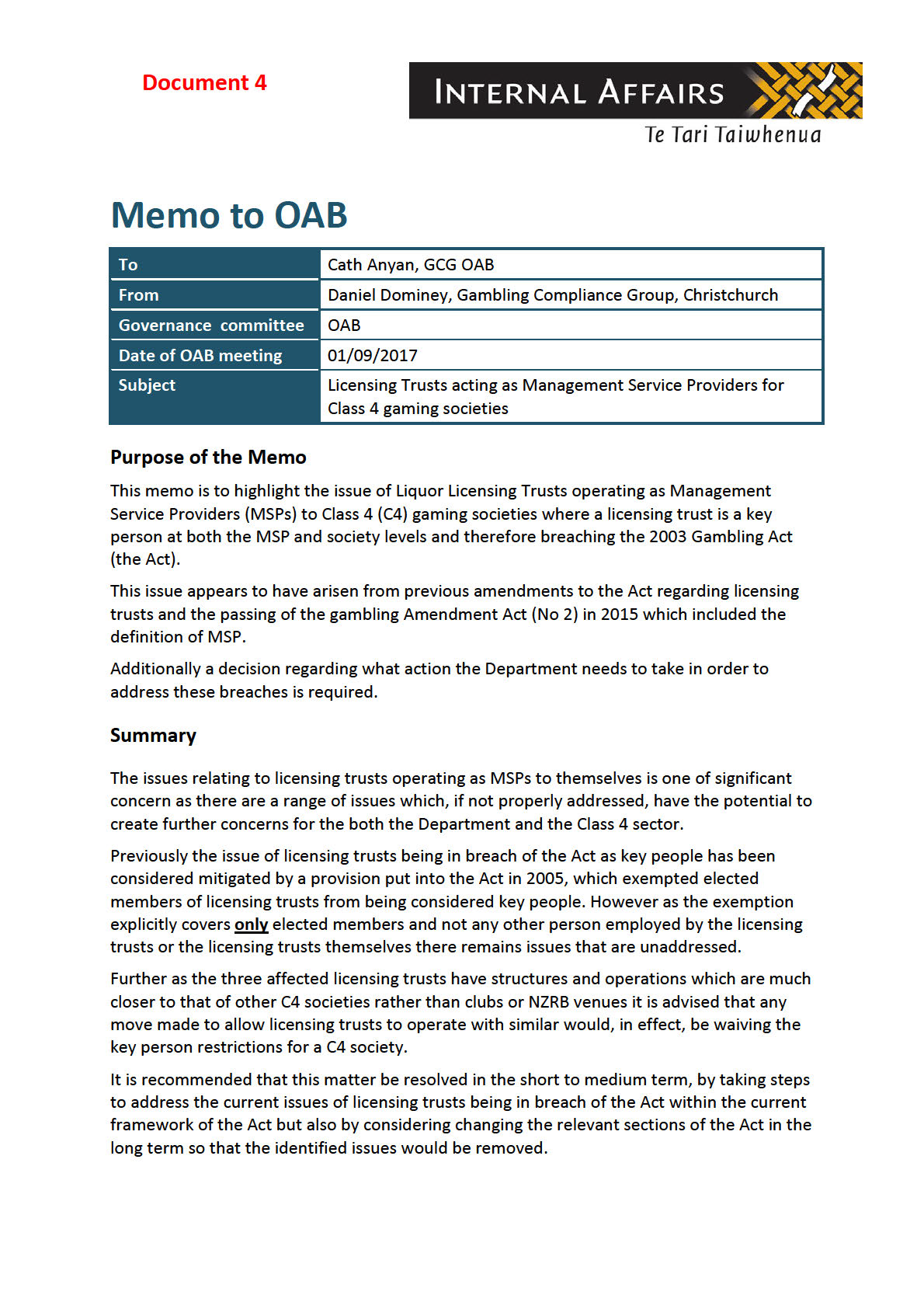
1982
Act
Information
Official
the
under
Released
Background
Three licensing trusts have been identified as providing MSP services to gaming societies
directly linked to themselves and therefore breach the Act by placing them as key people at
both the society and venue level.
They are Invercargil Licensing Trust (ILT), Mataura Licensing Trust (MLT) and Trust House Ltd
(THL) which respectively provide MSP services to ILT Foundation, TTCF and Trust House
Foundation.
Sections 52, 67 and 113 of the Act prohibit key people being at both the society and the
venue level. These sections exist to prevent conflicts of interest within the C4 sector. The
only exceptions to these prohibitions relate to Clubs, C4 venues operated by the NZ Racing
Board and to licensing trusts
but only to board members elected by the public to the
1982
licensing trust board.
In the case of licensing trusts, these exemptions do not extend to individuals empl
Act oyed by
licensing trusts or those who are associated with licensing trusts in any way.
The exemption regarding key people at licensing trusts was added in 2005 due to the 2003
Gambling Act not addressing the matter of licensing trusts operating as MSPs to themselves.
At the time the Department was satisfied that this mitigated any issue as MSPs were not
considered key people.
Information
In 2015, MSPs were added to the Act and licensing trusts were again in breach of it.
Additionally, in 2016 the Department initiated a sector wide audit of MSPs in the C4 space
(including the three licensing trusts) and one of the findings of that audit was that several
Official
MSPs (Trust House and 9(2)(b)(ii)
which had close links to the
gaming societies they acted for had much higher costs and much less robust contractual
arrangements than other MSPs ( the
9(2)(b)(ii)
) which were clearly separated from
those they were contracted to work for.
Trust House Ltd was found to have the highest costs of any MSP in the C4 sector, at a rate of
under
$800,000 per annum, which was wel in excess of both the industry average (see APPENDIX)
Discussion As licensing trusts meet the definition of both key person and MSP there is a clear breach of
the Act occurring.
Released
The previous position put to the Department on this matter (a memo from Operation Policy
dated September 2016) made the argument that the “mischief” the respective sections of
the Act were designed to prevent did not exist in the case of licensing trusts because they
were similar to clubs and NZRB venues, where key person restriction did not apply. This
argument was based on two premises:
• Licensing trusts are not for profit bodies that raise funds for philanthropic purposes
• The structure and organisation of licensing trusts was similar to that of clubs and
NZRB venues and as such there was a practical imperative to al ow such an
arrangement
Page 2 of 4
However any and all legally operating C4 societies are not for profit bodies which generate
funds for philanthropic purposes (ie to return to the community) and the structure of the
three licensing trusts in question is much closer to that of other C4 societies than a club or a
NZRB venue.
Al three licensing trusts have C4 operations which encompass multiple venues, and in the
case of two (TTCF and Trust House Foundation) across multiple areas or territories.
Also, unlike clubs which are limited to a single 18 machine venue, there is no restriction on
any licensing trust to a single venue or a capped number of venues or machines.
In addition both clubs and NZRB venues use C4 machines to raise funds for themselves and
have no obligation to return any funds to the wider community while the three gaming
societies associated with licensing trusts must distribute funds to the greater community and
1982
are expressly prohibited from making grants to themselves under the Act.
Therefore removing the key person restrictions from licensing trusts acting as MSPs would,
Act
in effect, be granting a key person waiver to the three C4 gaming societies. Such an
arrangement would not only remove core prohibitions of the Act for these societies but it
would also fundamental y alter the C4 landscape by creating an uneven playing field due to
any licensing trusts based society no longer having to abide by the key person requirements
of the Act while other C4 societies would remain restricted by them.
Finally, as the Act does not al ow licensing trusts to operate as they currently do, and there is
Information
no short or mid-term option to change the Act, legitimating their current state of affairs
would leave the Department open to chal enge by other actors in the C4 space as well as the
wider public.
Official
The risks of al owing the current state of affairs to continue or seeking to expand the current
exemptions licensing trusts have without altering the Act would be far greater than any
benefits the potential solution of al owing
the or legitimating the current state of affairs could
provide.
While it can be argued that the “mischief” which the relevant sections of the Act prevent
under
does not arise in relation to licensing trusts operating as MSPs, and that removal of this
restriction for licensing trusts would be similar to clubs or racing board venues such mischief
has occurred within the C4 space (operation Chestnut) and the structure and organisation of
licensing trust related gaming societies is almost identical to mainstream C4 societies rather
than clubs or NZRB venues (which are either singular entities with a cap on the number of
gaming machines (18) or organisations which raises funds purely for racing and with no
Released
ability to return funds to the greater community).
Further, while the means of electing board members to licensing trusts can provide some
mitigation to the risks noted, that mitigation does not extend to other individuals employed
by licensing trusts or prevent licensing trust related gaming societies from taking on C4
venues not connected to that licensing trust (as is noted in the case of TTCF).
Page 3 of 4
Suggested further action
It is recommended that the Department seek to address the current breaches of the Act as
they exist by considering options three; four and six as set out in the OAB paper from April
2017 (see APPENDIX) in the short to mid-term while considering changing the related
legislation in the long term.
These options entailed writing to the affected licensing trusts/gaming societies and setting
out that the Department considers them to be in breach of the Act, inviting comment from
them on this matter and requesting they propose how to address the issue.
The Department would provide a reasonable timeframe for this to take place and would only
enforce legislation if a licensing trust had not undertaken any action in this regard.
1982
These options have the advantage of both engaging with the licensing trusts, setting a
workable timeframe for action and making clear what possible outcomes exist.
Act
Further such an approach would minimise any disruption to both the related gaming society
and funding to the community.
Information
Official
the
under
Released
Page 4 of 4
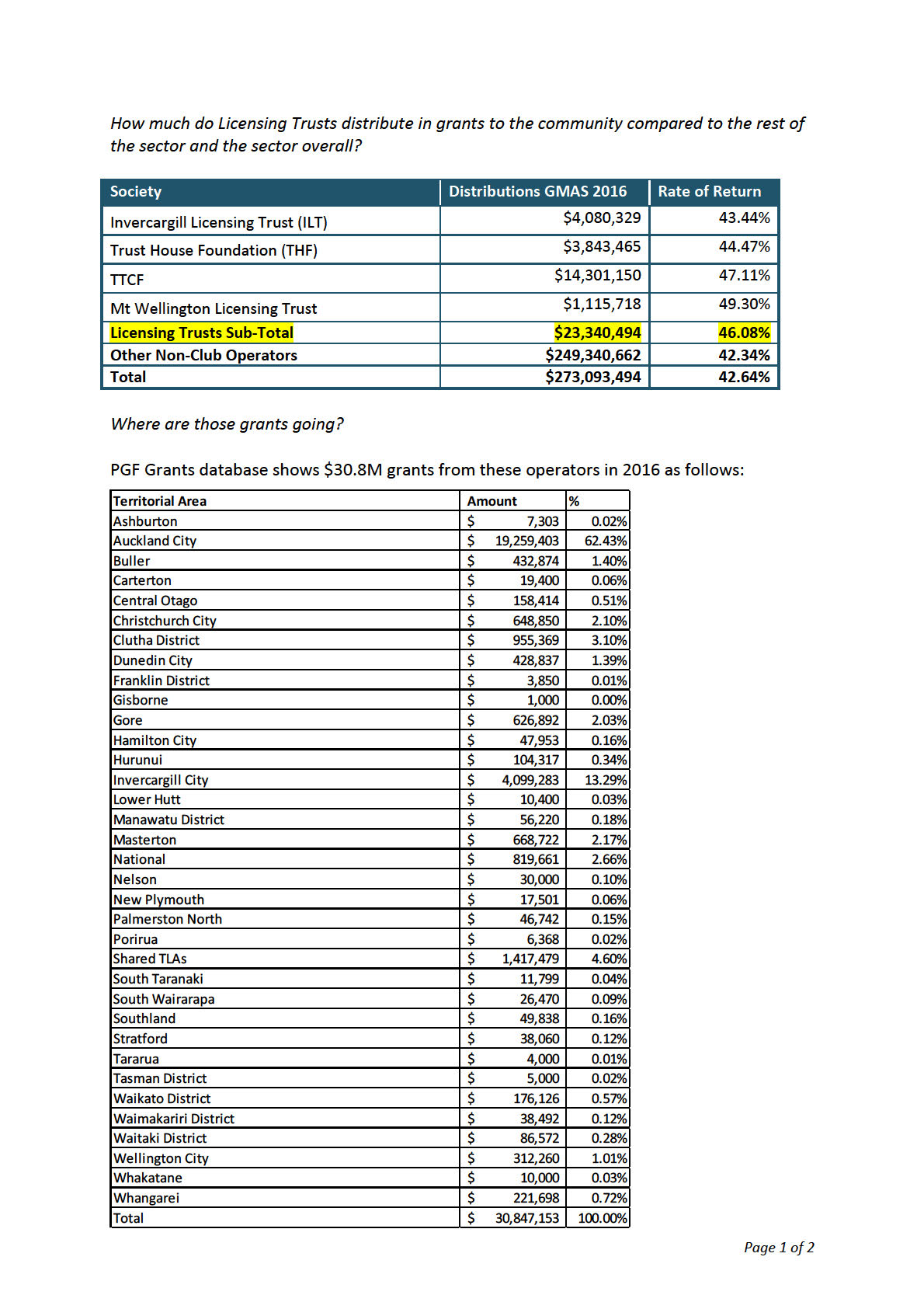
1982
Act
Information
Official
the
under
Released
What are the Number of venues and machines of the LTs compared to the rest of the sector
and as part of the sector as a whole?
See summary table, based on numbers as at 30 June 2017:
Societies
EGMs
% EGMs
Venues
% Venues
Licensing Trusts
946
7%
77
8%
Rest of Sector
11819
93%
859
92%
Grand Total
12765
100%
936
100%
Details for each operator as at 30 June 2017 are outlined in the following table:
Societies
EGMs
% EGMs
Venues
% Venues
AIR RESCUE SERVICES LIMITED
483
4%
36
4%
BLUE WATERS COMMUNITY TRUST
27
0%
2
0%
1982
BLUESKY COMMUNITY TRUST LIMITED
90
1%
6
1%
CERT Your Local Gaming Trust Limited
139
1%
9
1%
Act
CONSTELLATION COMMUNITIES TRUST LIMITED
80
1%
5
1%
DRAGON COMMUNITY TRUST LIMITED
117
1%
7
1%
FIRST LIGHT COMMUNITY FOUNDATION LIMITED
62
0%
4
0%
FIRST SOVEREIGN TRUST LIMITED
518
4%
33
4%
FOUR WINDS FOUNDATION LIMITED
401
3%
26
3%
GRASSROOTS TRUST LIMITED
513
4%
36
4%
ILT FOUNDATION
163
1%
10
1%
INFINITY FOUNDATION LIMITED
223
2%
15
2%
Information
KAIWAKA SPORTS ASSOCIATION INCORPORATED
8
0%
1
0%
MAINLAND FOUNDATION LIMITED
220
2%
14
1%
MANUKAU COUNTIES COMMUNITY FACILITIES CHARITABLE TRUST
90
1%
5
1%
Milestone Foundation Limited
18
0%
1
0%
MT WELLINGTON FOUNDATION LIMITED
36
0%
2
0%
Official
New Zealand Community Trust
2060
16%
152
16%
New Zealand Racing Board
476
4%
42
4%
the
OXFORD SPORTS TRUST INC
209
2%
13
1%
PELORUS TRUST
404
3%
26
3%
PUB CHARITY LIMITED
1688
13%
131
14%
REDWOOD TRUST INCORPORATED
18
0%
1
0%
under
SOUTHERN VICTORIAN CHARITABLE TRUST INC
41
0%
4
0%
THE AKARANA COMMUNITY TRUST LIMITED
63
0%
4
0%
THE BENDIGO VALLEY SPORTS AND CHARITY FOUNDATION
145
1%
11
1%
THE LION FOUNDATION (2008)
1780
14%
129
14%
THE NORTH AND SOUTH TRUST LIMITED
169
1%
11
1%
THE PEGASUS SPORTS FOUNDATION LIMITED
38
0%
3
0%
THE SOUTHERN TRUST
734
6%
63
7%
Released
THE TRUSTS COMMUNITY FOUNDATION LIMITED
566
4%
54
6%
THE WHITEHOUSE TAVERN TRUST BOARD
18
0%
1
0%
TRILLIAN TRUST
558
4%
36
4%
TRUST AORAKI LIMITED
134
1%
13
1%
TRUST HOUSE FOUNDATION
181
1%
11
1%
YOUTHTOWN INCORPORATED
295
2%
19
2%
Grand Total
12765
100%
936
100%
Page 2 of 2
 Document 5
Analysis of Masterton
Community Trust and Non-
Document 5
Analysis of Masterton
Community Trust and Non-
1982
compliance Issue
Act
s
June
Information
2021
Official
the
under
Released
IN-CONFIDENCE
Contents
Introduction ............................................................................................................ 2
Background ............................................................................................................. 2
Structure of Masterton Community Trust and its relationship to Trust House
Foundation ................................................................................................................. 2
Trust House Limited ................................................................................................... 2
Trust House Foundation ............................................................................................. 3
Non-compliance issues............................................................................................... 3
1982
Previous approach to non-compliance ...................................................................... 4
Discussion ................................................................................................................ 4
Act
Issues and risks in relation to conflicts of interest ..................................................... 4
First conflict of interest .............................................................................................. 5
Second conflict of interest ......................................................................................... 5
Potential options and their risks ............................................................................... 6
Option one: No action ................................................................................................ 6
Information
Option two: Legislative amendment .......................................................................... 6
Option three: Start a process to implement independent MSP services .................. 7
Implications for other licensing trusts ....................................................................... 8
Official
Appendix A: Decision-making table .......................................................................... 9
the
Appendix B: Legal advice ........................................................................................ 10
Appendix C: MSP costs across a range of MSPs ....................................................... 17
Appendix D: Letters sent to trusts that provide their own management services..... 19
under
Released
IN-CONFIDENCE
Page 1
Introduction
Trust House Foundation has applied to renew its class 4 operator’s licence. As a result of the
renewal, the Department has become aware of a number of breaches of the Gambling Act
that have persisted over a number of years without resolution.
The breaches in question relate to the conflict of interest in the structure of Masterton
Community Trust as a result of the venue company and society having the same key persons.
This is contrary to the Act which states that a key person at a society must not also be a key
person at a venue. This is designed to prevent conflict of interests from occurring and to
maintain the integrity of community funding.
1982
These issues also have implications for other community and licensing trusts that operate
under a similar structure to Trust House Foundation.
Act
Background
Structure of Masterton Community Trust and its relationship to Trust House
Foundation
Information
Masterton Community Trust is a community trust that was established in 1947 and operates
under the requirements of the Sale and Supply of Alcohol Act 2012.
The trustees are elected every 3 years and oversee the governance of the trust’s operations
Official
including Trust House Limited and Trust House Foundation.
the
Trust House Limited
Masterton Community Trust is a majority shareholder of Trust House Limited1. Trust House
Limited operates a range of businesses, including gambling venues, and distributes the
under
profits from those businesses to the community. It also provides other services such as
affordable housing for members of the community.
Trust House Limited is the venue operator for seven class 4 venues that operate under Trust
House Foundation. These venues are listed in the table below.
Released
Trust House Limited Venues:
Jackson Street Bar
Kuripuni Tavern
Post Office Hotel
The Farriers Bar and
The Ledge (Tavern)
Restaurant
Pukemanu Tavern
Flaxmere Tavern
1 Masterton Community Trust owns 94.26% of shares in Trust House Limited with the remaining shares owned
by Flaxmere Licensing Trust (3.97%) and Flaxmere Licensing (Charitable) Trust (1.77%).
IN-CONFIDENCE
Page 2
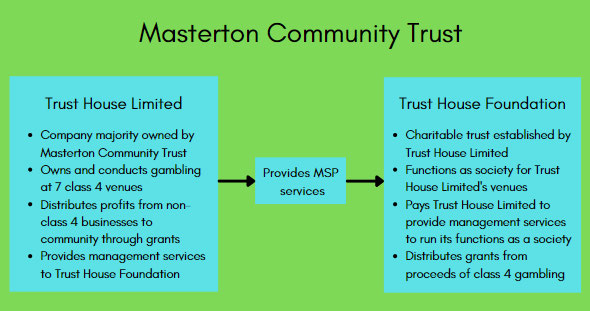 Trust House Foundation
Trust House Foundation
Trust House Foundation is a charitable trust set up by Trust House Limited to perform the
functions of an incorporated society under the Act which includes the distribution of
community grants from the net proceeds of class 4 gambling. Trust House Foundation
contracts services from Trust House Limited to perform the functions of a society. This
arrangement means that Trust House Limited is classified as a management service provider
(MSP) under the Act2.
1982
Act
Information
Structure of Masterton Community Trust
Official
Non-compliance issues
the
The relationship between Trust House Limited and Trust House Foundation presents several
longstanding compliance issues. These issues arose in 2016 when the Gambling Act was
amended to include MSPs as part of the definition of key persons3.
under
As a result of the amendment, a licensing trust that provides management services to itself
is captured by the key person requirements that state a key person must not be the same
key person for both a venue and a society. This means that Trust House Foundation and
Trust House Limited are potentially in breach of these requirements.
Released
9(2)(h)
2 Section 4, Gambling Act 2003– definition of key person.
3Gambling Act Amendment Bills No 2 & No 3.
IN-CONFIDENCE
Page 3
9(2)(h)
1982
Act
Previous approach to non-compliance
In late 2017, following a meeting with Masterton Community Trust and two other licensing
trusts (Mataura Licensing Trust and Invercargill Licensing Trust), letters were issued to the
Information
trusts and Jarrod True, acknowledging long-standing issues of non-compliance in relation to
the trusts providing their own management services.
The letters, dated between 24 November to 1 December 2017, state that an agreement was
Official
made by the Department and the trusts that the best way to address the non-compliance
the
was legislative change. It was agreed that until legislative change occurred, the Department
would take a pragmatic view and not take compliance action against any of the trusts
providing the existing arrangements within the trusts stayed in place. Copies of these letters
are provided in
Appendix D.
under
A letter to Jarrod True acting on behalf of Trust House Foundation and Trust House Limited
dated 24 November 2017, has provided confidence to the Trust that although the Act is
being breached, the Trust can continue to operate without the Department taking
enforcement action against it.
Released
Discussion
Issues and risks in relation to conflicts of interest
There are two primary conflicts of interest resulting from the breaches of the Act. Both
present risks with the integrity of Trust House’s gambling operations.
IN-CONFIDENCE
Page 4
First conflict of interest
The legal separation of a venue and society is to separate a venue’s commercial interests
from a society’s distribution of community funding, which should be impartial and focused
on providing social benefit for communities.
Having the same key person involved in both Trust House Limited and Trust House
Foundation creates a conflict of interest. Allowing this conflict to continue means there is a
risk that key persons who are involved in the commercial interests of Trust House Limited
may either be directly involved in or are in a position to influence decisions about the
distribution of community funding by Trust House Foundation.
1982
Second conflict of interest
The Act also specifies that venue key persons should not be involved in decisions about who
Act
provides goods and services to societies. This is to separate a venue’s commercial interests
from a society’s obligation to minimise its operating costs and maximise its return to the
community.
Although the risk of this conflict of interest seems low due to Trust House Limited returning
its profits back to the community, there is still potential for conflict of interest to occur. Key
Information
persons employed by the businesses owned by Trust House Limited have a self-interest in
the function of the businesses such as the income they claim as a result of their
employment. Further, key persons working across Trust House Limited and Trust House
Foundation may have the potential to determine their own income by determining or
Official
influencing the cost of an MSP contract.
the
Of concern is a draft analysis of MSP rates done in 2017 for an Outcomes Advisory Board
(OAB) paper on licensing trust issues that indicates that Trust House charges for MSP
services may be unreasonably high4. A copy of that analysis is provided in
Appendix C.
under
Further, Trust House Limited’s MSP contract provided with Trust House Foundation’s current
renewal application dated from 4 December 2019 to 4 December 2023 does not provide a
schedule of costs that show how the total cost of the contact for services was determined.
This means it is not possible to determine whether these costs are actual, reasonable and
Released
necessary.
4 This analysis was challenging due to the range of services provided by MSPs across the sector, and therefore
the difficulty of comparing costs across MSPs for the services provided per venue or per EGM. The full OAB
report can be located at
https://dia.cohesion.net.nz/Sites/COB/GCT/ layouts/15/DocIdRedir.aspx?ID=453MVHNNSJSQ-1354891029-
106
IN-CONFIDENCE
Page 5

1982
Act
Information
Official
the
under
Released
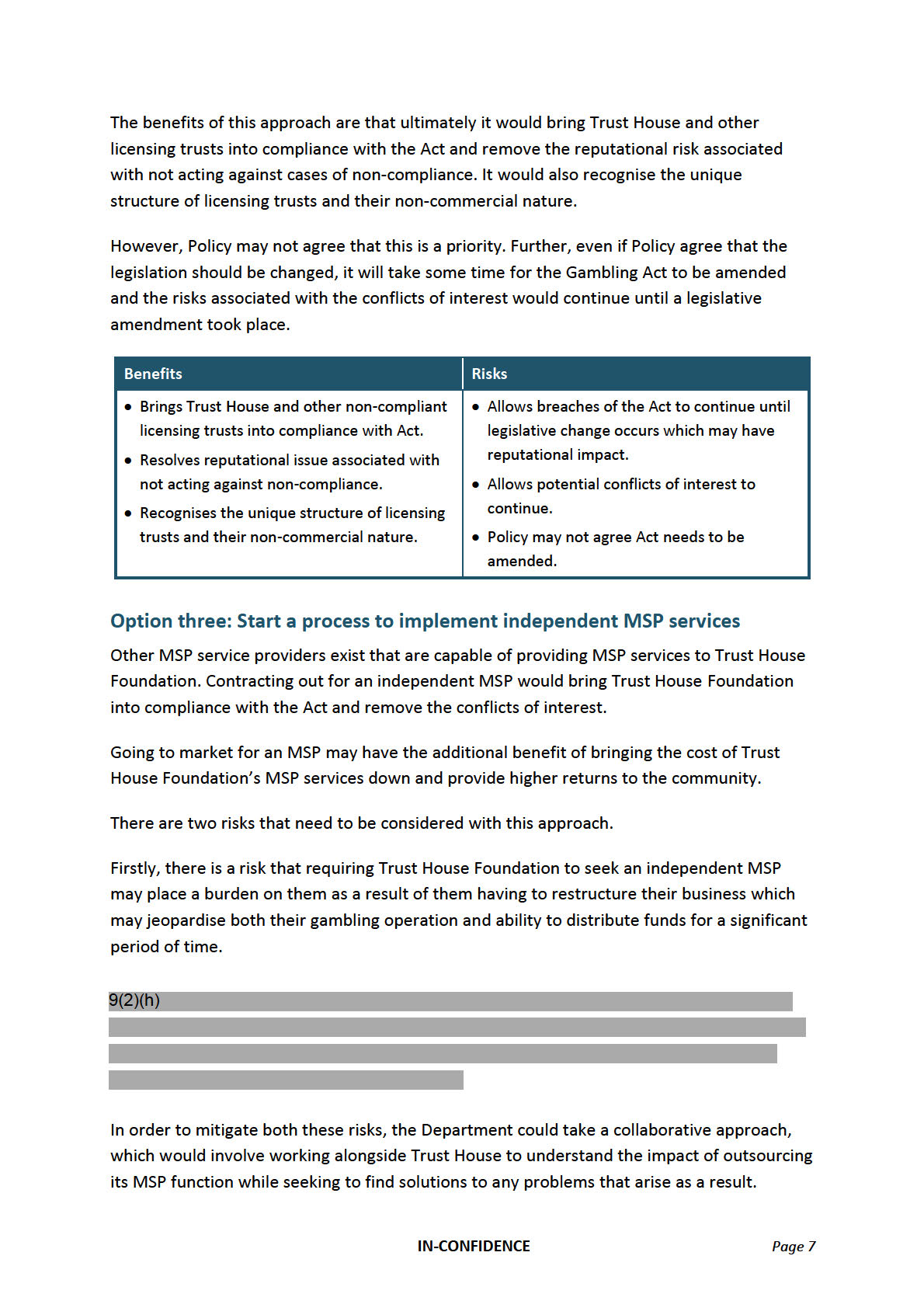
1982
Act
Information
Official
the
under
Released
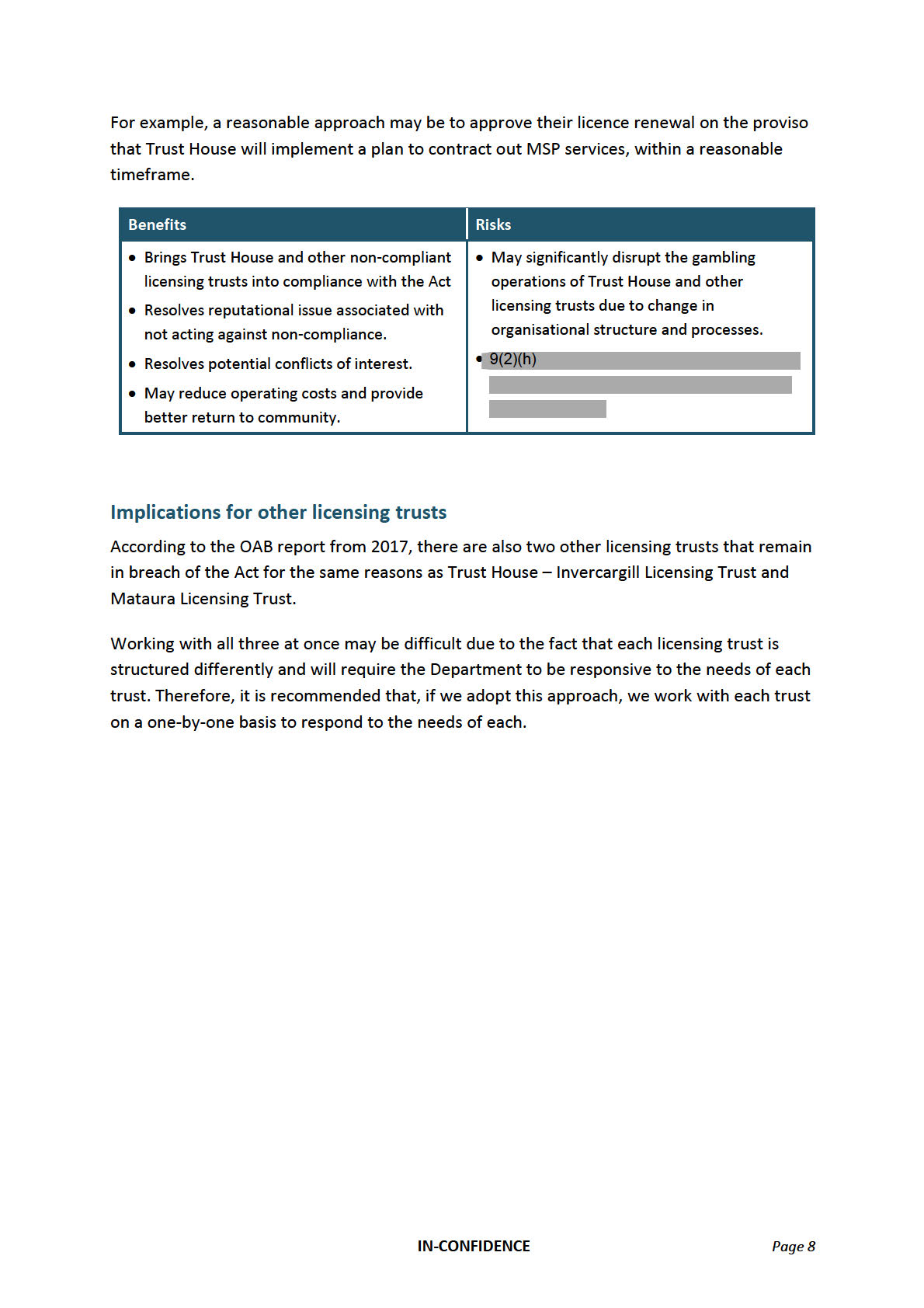
1982
Act
Information
Official
the
under
Released

1982
Act
Information
Official
the
under
Released

1982
Act
Information
Official
the
under
Released

1982
Act
Information
Official
the
under
Released
9(2)(h)
1982
Act
Information
Official
the
under
Released
IN-CONFIDENCE
Page 12

1982
Act
Information
Official
the
under
Released

1982
Act
Information
Official
the
under
Released

1982
Act
Information
Official
the
under
Released

1982
Act
Information
Official
the
under
Released
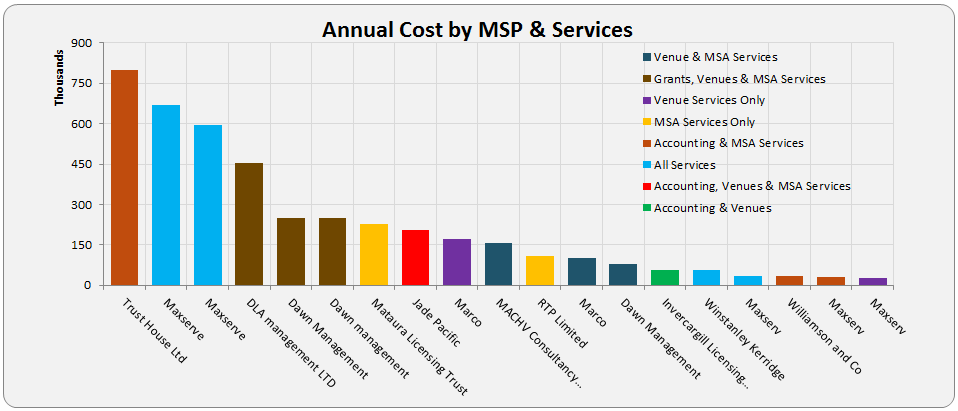
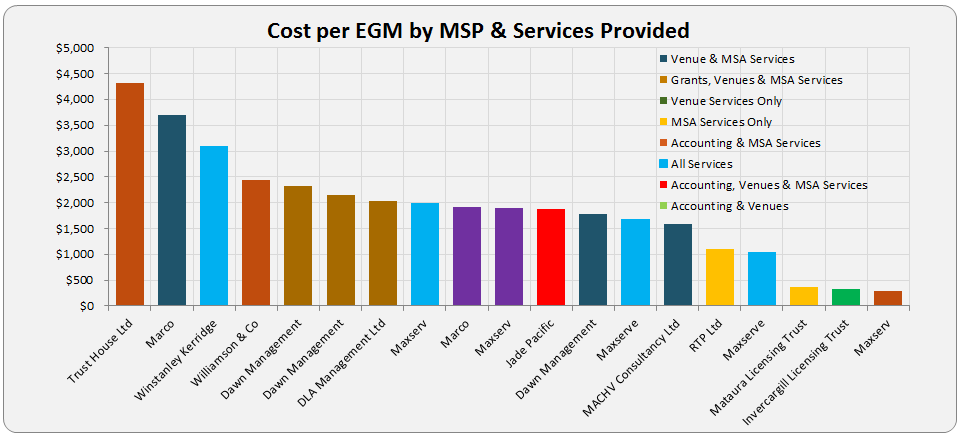 Appendix C: MSP costs across a range of MSPs
Appendix C: MSP costs across a range of MSPs
1982
Act
Information
Official
the
under
Released
IN-CONFIDENCE
Page 17
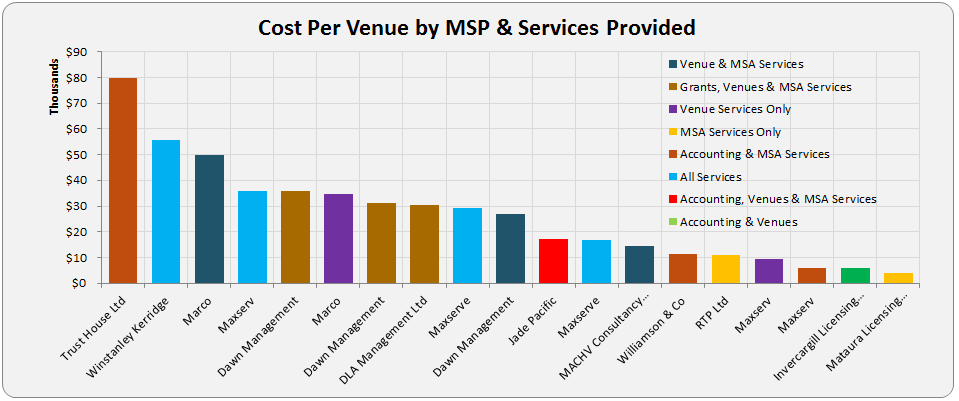

1982
Act
Information
Official
the
under
Released
Note: MSA refers to management, secretarial and administration services. Costs are based on limited
information and may contain some inaccuracies. Costs above do not have a time period specified which makes
a comparison against the current Trust House MSP contract in the licence renewal difficult as this is for a 3-year
period.
IN-CONFIDENCE
Page 18
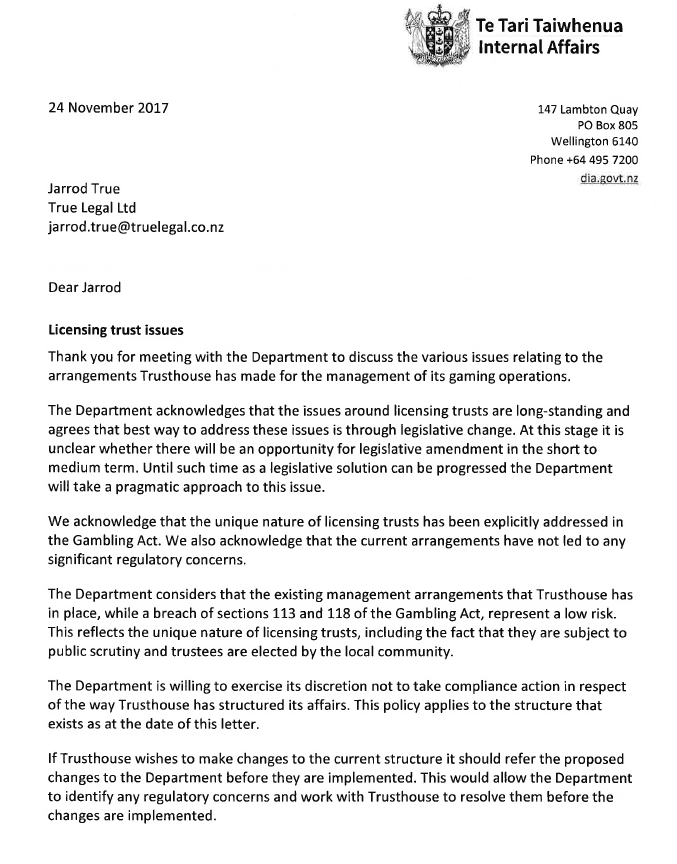 Appendix D: Letters sent to trusts that provide their
Appendix D: Letters sent to trusts that provide their
own management services
1982
Act
Information
Official
the
under
Released
IN-CONFIDENCE
Page 19
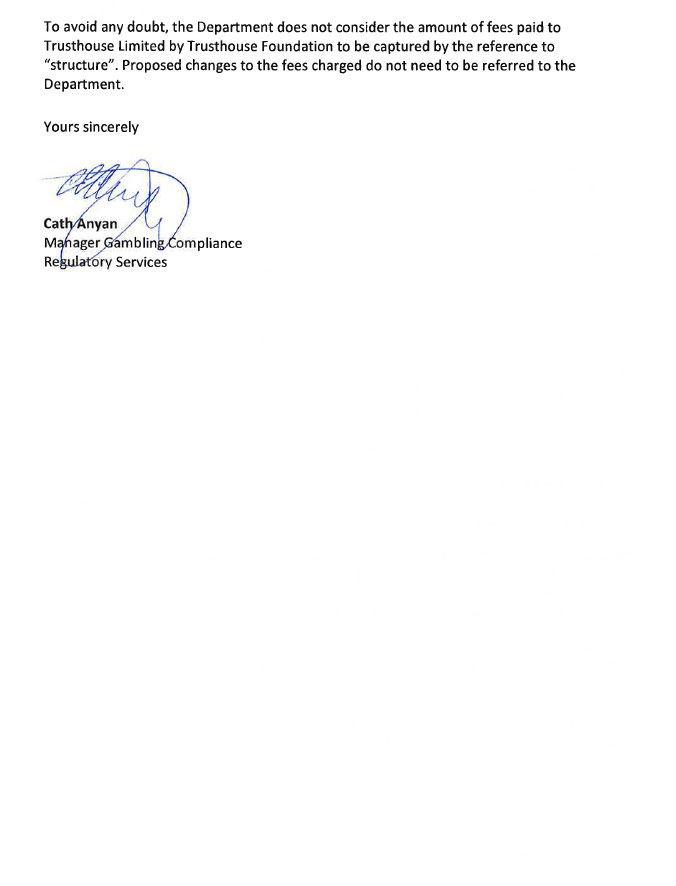
1982
Act
Information
Official
the
under
Released
IN-CONFIDENCE
Page 20
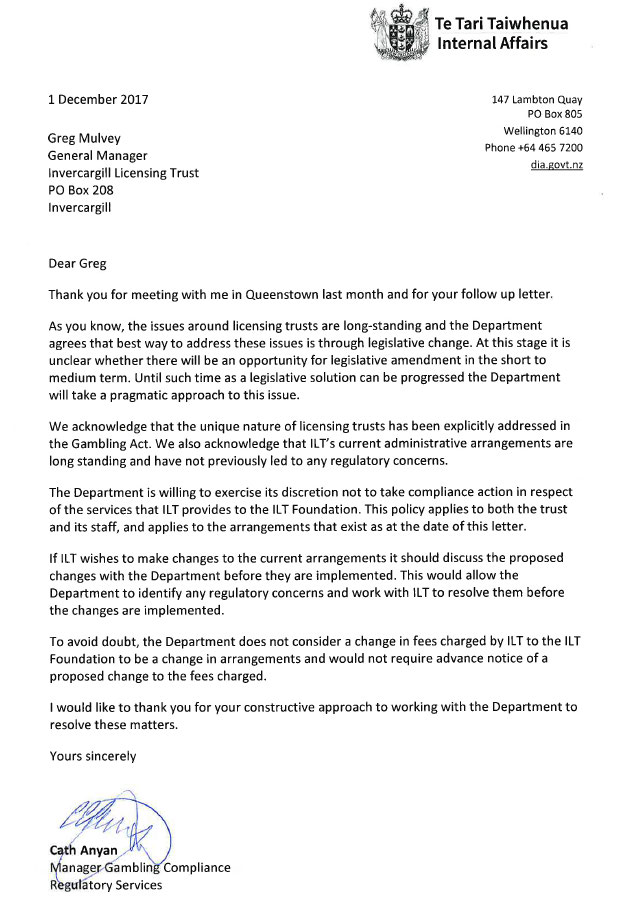
1982
Act
Information
Official
the
under
Released
IN-CONFIDENCE
Page 21
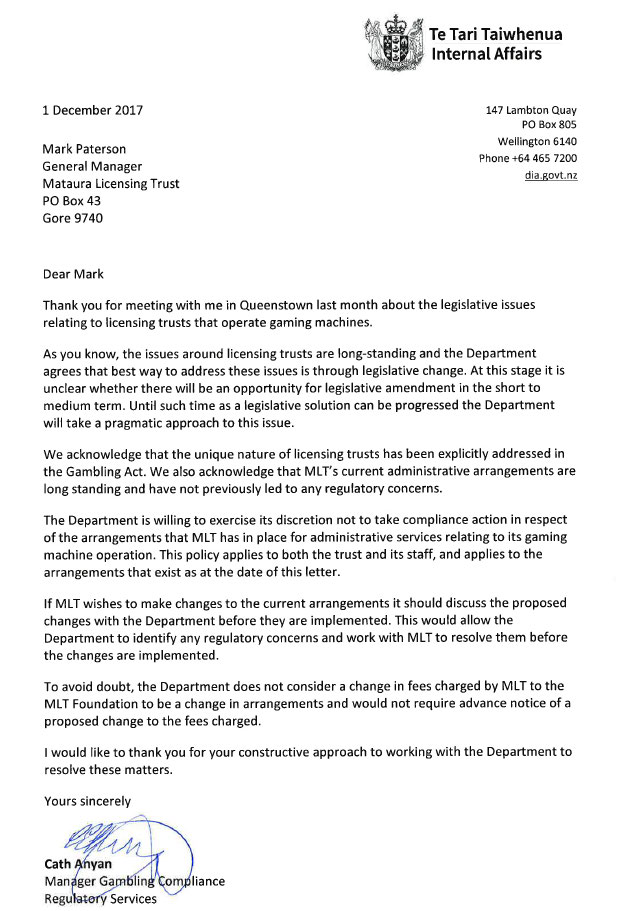
1982
Act
Information
Official
the
under
Released
IN-CONFIDENCE
Page 22

1982
Act
Information
Official
the
under
Released
























